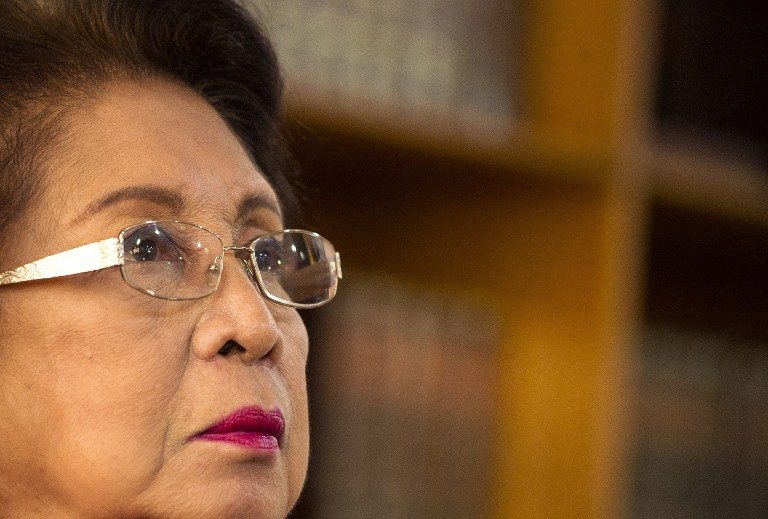SUMMARY
This is AI generated summarization, which may have errors. For context, always refer to the full article.

MANILA, Philippines – Ombudsman Conchita Carpio Morales on Friday evening, November 25, criticized the revision of history amid protests against the burial of the late dictator Ferdinand Marcos at the Libingan ng mga Bayani (Heroes’ Cemetery).
Morales did not directly mention the hero’s burial for Marcos. She spoke, however, in the context of the late dictator still being “the subject of the most rabid of debates and divergent views in the country today,” as his burial hogged the headlines in the past week.
She was delivering a speech at the alumni homecoming of the University of the Philippines (UP) College of Law – with her pointing out that one of the jubilarian classes entered law school in 1972, the year Marcos declared Martial Law.
During Friday’s event, Morales cited the 19th-century historian Lord Acton who said “that those who could not remember history are condemned to repeat it.”
The Ombudsman said: “As it turns out nowadays, those who could not remember history have the tendency to write a new one. Much worse, there are a lot of people who simply do not want to read their history, period.”
“This alarming attitude is appalling, to say the least, which opens a large portion of society vulnerable to a revisionist-distortionist proclivity,” she said.
Morales added: “It is an affront to our collective consciousness as a nation, aside from adding insult to injury to the entire citizenry as collective victims of the kleptocratic act of stashing ill-gotten wealth as judicially ascertained.”
She also criticized “post-truth politics where emotional impact rather than truth is what matters.”
She said Facebook, for one, “has become a searing battleground for propagandists, apologists, and trolls to foment dissension to a vulnerable, ill-informed young population.” (READ: Propaganda war: Weaponizing the internet)
She also cited the rise of fake news sites. (READ: Fake accounts, manufactured reality on social media)
Morales said: “When supposed ‘truths’ about Martial Law and the purported ‘progress’ that the Philippines enjoyed during the regime are considered more fact than fiction, then we see a transformation of our values as a people.”
Living in ‘dark times’
Morales is a native of Ilocos Norte, like Marcos.
Morales also has ties with the Duterte family. Her brother is the father-in-law of President Rodrigo Duterte’s daughter, Sara.
She, too, is a former justice of the Supreme Court (SC) – which, last November 18, voted 9-5 to allow a hero’s burial for Marcos.
Morales spoke a week after Marcos was buried at the Libingan ng mga Bayani, in a ceremony that critics denounced as “sneaky.”
On the day of her speech, protesters mounted nationwide rallies against the hero’s burial for Marcos.
In her speech, Morales quoted a UP law alumnus who said Filipinos live in “dark times.”
Morales then spoke of the need for good leadership.
To drive home this point, the Ombudsman again quoted from Lord Acton who said, “Great men are almost always bad men.”
Morales said: “Indeed, the country does not need great leaders, because, more often than not, they become great after having enmeshed in muddy rivalries and acquired a network of compromises. It is enough that leaders remain good in the purest sense of the word.”
She added: “The monstrosity of supremacy and the trappings of power aptly explain why great people fall as prey and transform as predators themselves.”
Morales said, “Just because you can, does not mean you should.”
While Morales did not directly address this to anyone, it was a message that Duterte critics earlier directed at the President. This was after Duterte approved a hero’s burial for Marcos because the law allows him to do it.
Morales said: “The relevant message is that we cannot pretend to end impunity by clothing ourselves with impunity as well. He who enforces accountability must himself be ready to assume accountability.” – Rappler.com
Add a comment
How does this make you feel?
There are no comments yet. Add your comment to start the conversation.